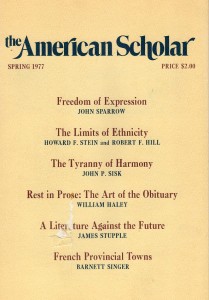Magazine Review: The American Scholar Spring 1977 Edited by Joseph Epstein
The American Scholar is a quarterly production of the Phi Beta Kappa Society, published since 1932. Its primary focus is non-fiction essays, but it also features poetry, book reviews and since 2006 fiction. I happened across an old issue, was intrigued by one of the essay titles, and decided to review it. At the time it was published, I was in my sophomore year of high school, Jimmy Carter was president of the United States and James Dobson founded Focus on the Family.
Leading off the issue is “The Despairing Optimist” by René Dubos. It discusses the various international conferences held during the 1970s. The essay describes their well-meant aims and somewhat less than impressive results. Professor Dubos reckons that the best approach is to set world-wide goals but work out individual approaches to getting things done as different areas of the world need specific tactics to deal with their specific problems. “Think globally, act locally.” (Professor Dubos is said to be one of the possible originators of the motto when he was advising the Stockholm United Nations Conference on the Human Environment in 1972.)
“Observing the Sabbath” by Aristides (probably a pen name) is about the custom of Sunday as a day of rest, and how that was changing in the modern age. Less a span of enforced inactivity, and more a time of enjoying oneself as religion became less of a factor and just having some time off work became more of one.
“Freedom of Expression: Too Much of a Good Thing?” by John Sparrow talks about whether there should be laws against obscenity and pornography. He discusses various objections to these laws, and attempts to address them. On balance, Mr. Sparrow is in favor of having at least some laws on the subject, even if it’s difficult to precisely define obscenity without actually being subjected to it. Generally, he seems to favor “community standards” laws.
“The Limits of Ethnicity” by Howard F. Stein and Robert F. Hill addresses the then recent upswing in “ethnic pride” groups in the United States, and they note that at least part of the impetus appears to have come from the civil rights advances of African-American people. “Racism is a WASP problem, we Croatian-Americans or Italian-Americans have no culpability here–besides, we’re oppressed groups too.” The authors feared attempts to re-segregate neighborhoods by moving all the people from one ethnic heritage together, making those of other heritages uncomfortable.
One of the weaker essays is “The Tyranny of Harmony” by John P. Sisk. It starts out talking about the music of the spheres, which supposedly had perfect harmony, and eventually gets around to suggesting that an excessive love of harmony resulted in Nazi Germany. The logic is forced.
“Rest in Prose: The Art of the Obituary” is by William Haley, who was editor of the London Times for many years. He speaks of the obituary as a literary form, as history, and as an editorial comment on the worth of a person. He’s especially enamored of the obituaries published by the Times. Mr. Haley is a good writer and I enjoyed this essay.
“A Literature Against the Future” by James Stupple is the essay I bought the magazine for. He notes that in the 1970s science fiction had become the subject of serious university study. (Though he’s quick to point out that the colleges offering these courses tended to be second-rank.) His main premise is that SF isn’t really serious, important literature. Like many critics in the 1970s, he thought that real science showing that Mars is lifeless would kill the field, leaving only science fantasy. Indeed, he suggests that science fiction would quickly become no more relevant than Kabuki or country western. (Well, okay, maybe country western.) From our perspective in the future, it’s easy to see where Mr. Stupple went wrong. (The only other thing I could find by him in a Google search was half an essay on Ray Bradbury; he liked Bradbury’s stuff as fantasy.)
The final essay is “The Provincial Towns” by Barnett Singer, who wrote about his experiences the previous year touring the less-populated areas of France. He chronicles the dying of an old way of life, but then old ways of life are always dying. It’s rather sentimental, but he also notes that the young people seem okay with the changes.
The poetry is all that modern stuff I don’t care much for. The best of the lot is “On the Language Which Writes the Lecturer” by Jeanne Murray Walker. “English merely comments on the structure of another language concerning which nothing can be said.”
There are several book reviews, all of books I have never heard of. The most positive review is of The Autumn of the Patriarch by Gabriel Garcia Márquez. Sadly, despite the enthusiasm of the reviewer, it sounds dreadful. There are also a lot of book ads. Most of these are the barest snippets that seem to have been written by someone who doesn’t know anything about selling books.
The other kind of advertisement is for colleges–apparently the main audience was expected to be bright high school students looking for a place to get further education. Saint Olaf!
Last is Letters to the Editor, very erudite people criticizing essays and reviews (in one case, a book reviewer is allowed to respond.)
It’s an interesting assortment of subjects, most of which don’t feel dated. If you happen to spot a copy of this magazine at a garage sale, it’s worth a look. The American Scholar is still published, and you can read more recent essays at their website here: https://theamericanscholar.org/about-us/
“

